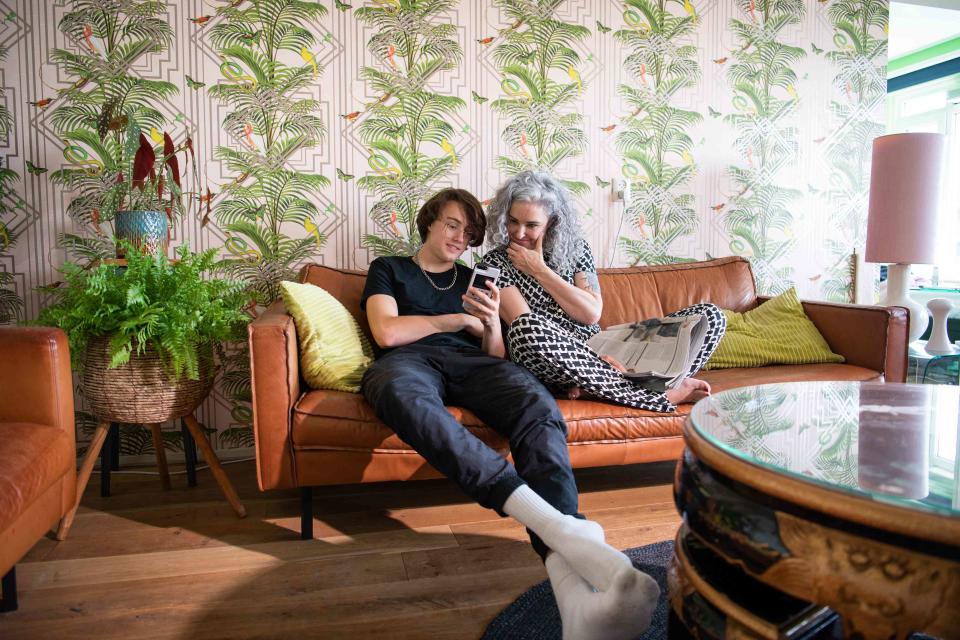Social Media Diagnosed Me With ADHD
How one mom's endless scrolling led to an ADHD diagnosis—and helped her embrace who she really is.

Lucy Lambriex/Getty Images
Fact checked by Karen Cilli
It's one of the most globally recognized behaviors. About as common as brushing one's teeth. I'd be willing to bet that everyone reading this does it: scroll endlessly through social media, pausing only to laugh at memes. But what if the joke is on you?
Because that's exactly how I came to recognize that I have ADHD—like some 10 million adults in the United States (and 366 million worldwide).
Like many, what I knew about ADHD had come to me by way of cable news reports or casual conversations where people threw about stereotypes of what the disorder looked like. I recall one particular chat with my daughter's third grade teacher, where she shared her concerns about the ADHD behaviors my kid was exhibiting in class—like trouble listening and focusing and disorganization. The teacher told me that it would likely become a big barrier for her over the next few years as academic concepts grew more complex.
I was terrified. Something was "wrong" with my kid. Little did I know, something was neurodiverse with me, too.
Related: The Best Online ADHD Therapy Services for Kids and the Parents Who Love Them
Over the next couple of years, I did my best to learn what I could about ADHD. And I worked closely with my daughter to find strategies that would help her in school. But it was social media that made all the difference for our family.
It first started on Clubhouse, the audible social media platform. It was there where I met some incredibly successful and talented people that shattered every preconceived notion I had about ADHD. We had in depth conversations that weren't necessarily centered on neurodiversity, but that included thoughtful, and sometimes light-hearted mentions of the struggles that can come with being neurodiverse. And most importantly, how those struggles are managed and overcome.
It wasn't long before social media algorithms worked their magic, and I began to see memes in my Instagram feed depicting adorable cartoon dinosaurs and their daily, comical ADHD thought processes. These simplified but relatable caricatures helped me digest what my daughter was experiencing and then one day I saw myself in them, too.
Online, I found a community of people who were loud and proud in talking about their mental health. In fact, TikTok alone has more than 30 billion views on the hashtag #ADHD, and over 2 billion for #ADHDtok, and the community profiles creators through #MentalHealthAwareness month and beyond. Through memes, graphics, and honest posts from people I was following I began to recognize behaviors that I had long struggled with and assumed were no more than personal flaws I continuously failed to change.
From forgetfulness to impulsiveness to an incessant need to interrupt others when they're speaking, all my "flaws" were increasing with severity as I got older. I had masked them so well when I was younger, having had a strict father with high academic expectations forced me to hide them. But that became much harder to do when I was the one expected to be the adult.
How could I be forgetful, messy, or thoughtless if I wanted my own kid to improve on her character? I compared myself to other moms who seemed to have their adulting in order. They didn't forget birthdays or invitations. Hell, I had gotten to the point where I could tell you that I would meet you somewhere later that day, and within the hour I would forget all about those plans.
It didn't help that I was putting a lot on my shoulders. I worked full time and tried to make sure I was present for all my daughter's activities—the ones I didn't forget. I had gone back to school full-time, was writing a novel, and freelancing my marketing services. Somewhere in between all of that, I also needed to help run my home—right.
It wasn't until I saw myself reflected through comic strip-styled posts that playfully yet helpfully represented the different ways ADHD can present itself, that I realized I was doing myself real harm by setting such high expectations with no room for grace or forgiveness. More than anything else, social media pushed me to get myself evaluated so that I can better care for my and my daughter's mental health.
My assessment returned a result of severe ADHD—and, unlike the fear that I felt when I was first told to consider having my daughter assessed, I felt relief.
Now, at nearly forty, I finally understand who I am and why I think and act the way I do. And, as a parent, I feel armed with the sensitivity necessary to help my daughter navigate neurodiversity and her own behavior patterns. With the help of counseling, the both of us continue to develop strategies that serve our creative brains and improve our social lives.
Related: Continued Adderall Shortage Means Struggles for People With ADHD
And while I wouldn't recommend that people seek out medical advice via social media, I am a firm believer that the share-heavy society that we have become has as many positive outcomes as negative ones. Whatever your vice, be it TikTok, Instagram, or Twitter, there are no shortage of tips and strategies for mental health on social media.
As with anything, my advice is to proceed with caution, but not to discount how eye opening it can be. For all the staged and glamourous social media profiles that there are out there, there are an equal number of informational resources that at the very least can shed light on some questions we may have and that can spark important conversations we should be having around mental health.
For more Parents news, make sure to sign up for our newsletter!
Read the original article on Parents.

